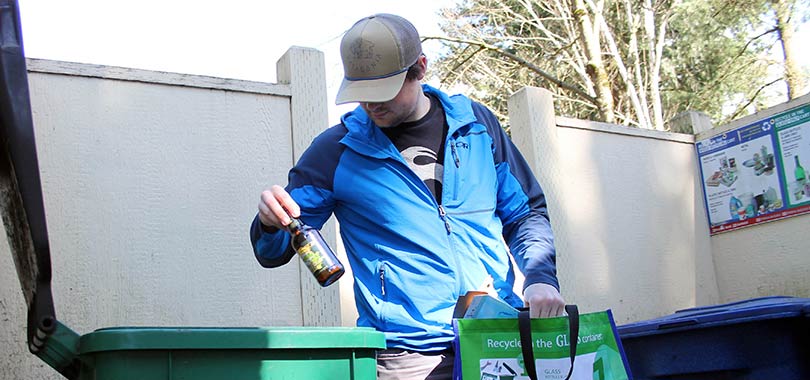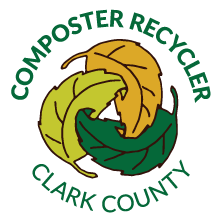As humans, we generate lots of “stuff.” Caring for our planet, our health, and our community means making sure the stuff we don’t use, need, or want anymore is, whenever possible, reused or recycled, and finally, properly disposed of.

When you toss or recycle, where is away?
In Clark County, private companies, under contract to the county and/or to cities within the county provide recycling collection, sorting, processing, and marketing services. Contracted haulers provide residential recycling collection in the cities and throughout the county.
There are no active public landfills in the county. Most waste from Clark County is barged up the Columbia River to the Finley Buttes landfill near Boardman, Oregon. Three garbage transfer stations offer free drop-off of recyclable materials during all business hours and free drop-off of household hazardous wastes on specified dates each month.
Learn more about transfer stations
- West Van Materials Recovery Center
- Central Transfer Recycling Center
- The Washougal Transfer Station
Closing the Materials Loop – Curbside Recycling
Curbside recycling is available to ALL residents of Clark County. In some cities and urban growth areas, curbside recycling is mandatory. The City of Vancouver uses rolling carts for residential curbside recycling. In all areas, recycling is picked up on the same day as garbage (self-haul garbage customers are given a recycling schedule). Residents are assigned a pick-up day when they sign up for garbage service.
How do I know who my recycling service provider is?
In all areas of Clark County except the greater Woodland area, contact Waste Connections, Inc. (360) 892-5370 or customerhelp@wasteconnections.com.
If you live within the City of Woodland, contact Waste Control at (360) 225-7808.
What goes in the recycling cart?
Check out this ![]() Curbside recycling guide for Vancouver’s roll carts. Please note that the following items are often confused as being recyclable in your curbside bin. Sadly, they are not!
Curbside recycling guide for Vancouver’s roll carts. Please note that the following items are often confused as being recyclable in your curbside bin. Sadly, they are not!
These items should NOT go in your recycling cart:
- Lids from plastic containers
- Styrofoam™
- Plastic take-out containers from restaurants
- Cardboard boxes used for freezer/refrigerated items (like frozen dinners, canned soda boxes, 6-pack carriers, etc)
- ANY recyclables that are dirty, wet, or covered in food (make sure it is CLEAN AND DRY)
- Grocery produce “clamshells” often used for cherry tomato or berry containers
- Plastic bags
- Glass
Glass is collected in its own container. Plastic bags (and other film plastics) can be recycled in drop off containers in the entryway to your local grocery stores.
Some items that don’t go in the recycling cart can be recycled
Many items are not accepted in your curbside cart but can be dropped off at one of the local transfer stations, or at other recycling businesses. Not sure what can be recycled or where?
Check out the A-Z Recycling Directory
Self-Haul Recycling
A community building idea that makes a difference
Get together with your neighbors or neighborhood association to pool your recyclables or materials that cannot go in the roll cart, and take turns doing a run with them to the transfer station or a collection site. It’s a great way to build community, save money, and reduce individual car trips!
Can I self-haul my own recycling?
Yes indeed. Both transfer stations will accept your self-hauled recyclables. West Van Materials Recovery Center offers a buy back program for some recyclable commodities. Please call (360) 737-1727 for specific information on the types of commodities accepted, minimum quantities to qualify, material preparation requirements and current buy back rates.
Other Items accepted for a fee:
- Yard debris
- Clean wood
- Sheet rock
- Appliances (best to donate working appliances to those who can use them)
Toxic Stuff: Household Hazardous Wastes
Many household products (herbicides, pesticides, toxic cleaning products, paint, etc.) contain hazardous chemicals that can, if not properly disposed of, make their way into the environment, contaminate waterways and harm pets and wildlife. If you live in Clark County, there are many opportunities to properly dispose of hazardous waste from your household. You can take it to any one of the three transfer stations.
Compact fluorescent (CFL) light bulbs are considered hazardous waste. They contain mercury and it is important to dispose of them properly – not in your trash can. You can also check out Light Recycle for more information and to find more collection locations.
What About Electronics?
Washington has a great product stewardship program to help salvage usable materials from used electronics and to remove the toxic materials contained in some items. The majority of the electronics are disassembled for recycling here in Washington. Some electronics go out-of-state for processing and some materials are exported for recycling at approved facilities. Metals, plastics and glass are separated and sold as commodities to be reused as raw materials in the manufacturing of new products. Clark County maintains a complete list of locations where you can recycle electronics in our area.
Households can recycle these items for free!
- Televisions
- Computers
- Computer monitors
- Portable or laptop computers including tablets
- E-readers (also called e-book readers)
E-cycle is a great Washington resource. This site can help you find out where you can recycle electronic items in your community.
Plastic Bags and Wrap
It’s clear: Plastic wraps, bags and film packaging abound. From the wrapper around paper towels, to the plastic enveloping a new shirt, to the sleeve holding the newspaper, to a plastic bag containing bread. Unfortunately, these materials are often wasted or become litter instead of being properly recycled as valuable resources to produce new products.
You can return clean, dry, empty plastic bags/film/wrap to recycling drop off locations. Look for recycling bins near store entrances. Enter your zip code at plasticfilmrecycling.org to find locations near you. These recyclable plastics include:
- Retail, Newspaper, Dry Cleaning, Bread, Produce, and also other Plastic Bags labeled #2 and #4
- Zip Close Food Storage bags (clean and dry)
- Furniture and Electronic wrap
- Plastic cereal box liners (if it tears like paper do not include)
- Plastic shipping envelopes, including Tyvek ®, bubble wrap and air pillows (Remove labels and/or deflate)
- Product Wrap (used on paper towels, diapers, bathroom tissue, water bottles)
- Any film packaging or bag that has the How2Recycle Label
Recycling Construction Debris
“If yard debris, construction and demolition wastes, and a few other materials are considered, the amount of ‘garbage’ that could be easily recycled exceeds 60-70%.” (ref. Hlavka, R. “Recyclables in the Wrong Can”). Do your part to help properly dispose of construction debris! Here are some great resources:
The Clark County construction salvage and recycling toolkit offers listings to help builders, developers, architects and residents find resources to assist with commercial and residential projects. This can result in lowering project costs by saving time and money through reuse and recycling of materials that would otherwise go the landfill. This free publication contains over 60 recycling sites within a ten-mile distance of the Vancouver side of the Columbia River.
Transfer stations and several companies in Clark County, WA accept construction debris (charges may apply), used motor oil and other automotive wastes. See Recycling A-Z for a full list.
The ReBuilding Center (Portland, OR) offers DeConstruction Services, a sustainable alternative to conventional demolition. Working by hand, their skilled crews salvage up to 85% of a building’s major components for reuse.
Metro Regional Services publishes ![]() Metro Construction Industry Recycling Toolkit that lists recycling locations in the Portland area that accept construction debris. The Toolkit is also available at the Clark County offices. Another wonderful resource is the Portland Metro Recycling Information hotline: (503) 234-3000.
Metro Construction Industry Recycling Toolkit that lists recycling locations in the Portland area that accept construction debris. The Toolkit is also available at the Clark County offices. Another wonderful resource is the Portland Metro Recycling Information hotline: (503) 234-3000.
Have something else to recycle?
Do you have something else to recycle but don’t know where to take it? Check out Recycling A-Z, the ultimate recycling directory for Clark County, Washington.
What about re-use?
EPA studies show that a community benefits from the creation of jobs from reuse. Keeping good stuff in use helps our community, and is a smart thing to do. If you have items you no longer want or need, consider donating them. There are many thrift stores in Clark County that accept usable items. Make a difference by supporting sharing and re-use in our community.


